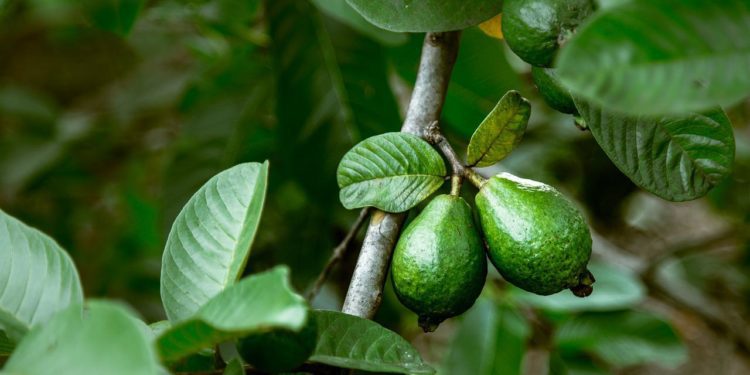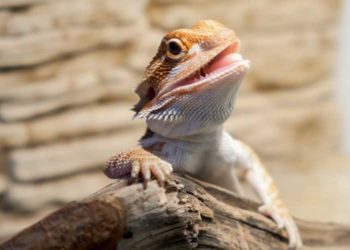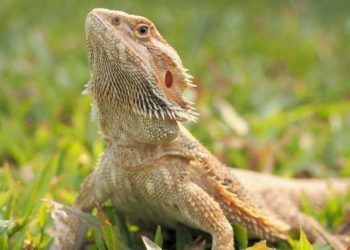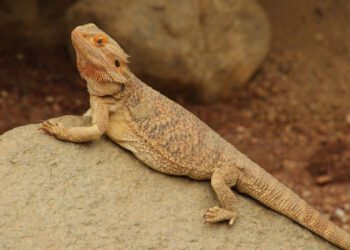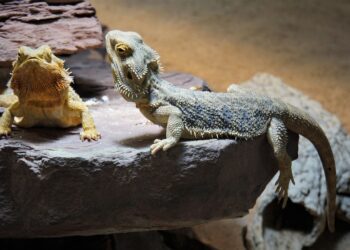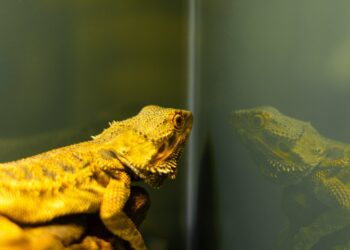Yes, a bearded dragon can eat guava but in small quantities and not on regular basis. Guava has a typical fragrance similar to lemon rind but not that sharp. Its outer skin varies in taste depending upon the type of species usually green in color in maturity and becomes yellow when it is ripe.
The most interesting part about guava is the presence of fat, sugar, protein, water, phosphorous, and calcium in it. Also, for the calcium to phosphorous ratio, for every phosphorous part, there needs to be another part of calcium if not more. For an ideal food to be served for bearded the calcium to phosphorous ratio must be 1:1 or 2:1.
So bearded dragons can eat guava but only in small amounts moderately because it is not considered healthy for your bearded dragon due to the presence of oxalates present in it. Another reason why guava is not healthy for a bearded dragon is the presence of fruit sugars which means glucose, carbohydrates, and phosphorous, but is low in calcium, magnesium, potassium, and sodium.
So as an owner if you want to feed guava to your bearded dragon then you can serve but in very low quantity and once a week.
Contents
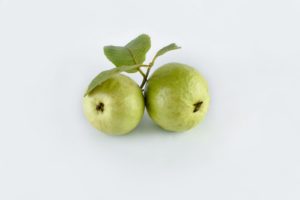 Nutritional Value of Guava per 100g
Nutritional Value of Guava per 100g
- Sugars – 8.9g
- Carbohydrates – 14g
- Energy – 285Kj
- Fat – 0.95g
- Dietary fiber – 5.5g
- Protein – 2.5g
- Vitamin B6 – 8%
- Vitamin C – 275%
- Vitamin K – 2%
- Iron – 0.26mg
- Calcium – 18mg
- Phosphorous – 40mg
- Potassium – 417mg
- Manganese – 0.15mg
- Zinc – 0.22mg
- Sodium – 2mg
- Magnesium – 0.15mg
From the table, it is shown that guava is quite acidic and also has a disproportionate ratio of calcium to phosphorous, and is also quite high in sugar content. From this, it is clear that guava is not as safe as other fruits like apples, bananas, kiwi, etc, and cannot be fed daily.
So guava is not good also due to its acidic nature and presence of high sugar content and phosphorous more than calcium. It is recommended not to feed guava to your bearded dragon and if you are willing to then give one small slice but just once a week.
How Guavas are good for Bearded Dragons?
Guava is not safe for bearded dragons to feed due to the presence of high phosphorous, carbohydrates, fats, and sugars but despite that, it has some benefits due to the presence of a good amount of vitamin C, with one guava containing approximately 20% of the daily recommended intake of vitamin C.
Bearded dragons also eat the seeds of guava as they are also good for bearded dragons but recommended not to eat because they are hard to digest. It might cause some digestive-related problems to them due to the poor digestion of guava seeds.
Talking about unripe guava, it is not properly known whether or not bearded dragons can eat them, so it is better to leave them out of the diet of your pet bearded dragon.
Can Bearded Dragon Eat Guava Leaves?
Yes, bearded dragons can eat guava leaves of guava plants. Unlike guava fruit, the leaves of guava plants are safe for bearded dragons to eat when they go out into the backyard or even in the wild. Wild bearded dragons eat the leaves of many plants including guava to survive. Guava is a fruit that is found in many places around the world.
Why is Guava not a Safer Food for Bearded Dragons?
- Guava contains many contents which are not safer for bearded dragon’s health due to this it is not recommended in the diet chart of bearded dragons. Following are some reasons why guava poses danger to bearded dragon’s health.
- Consumption of oxalates is not good for the bearded dragon’s health and the skin of guava contains a good amount of oxalates approximately 5 times more than the flesh which a bearded dragon cannot digest easily and can lead to digestive related issues.
- For a healthy food for bearded dragons, the calcium to phosphorous ratio is considered as 1:1 or 2:1but in guava the amount of phosphorous is very high as compared to calcium which is also not a good sign.
- Consumption of carbohydrates and sugars can lead to obesity and bloating in bearded dragons which makes dragons dull and lethargic.
Which Fruits Can Bearded Dragon Eat?
Besides the veggies and small insects, you can also add some fruits as a topping to give the reptiles some more appealing and enjoyable food to eat. Fruits can be added once or twice a week as a snack as they do not have lots of minerals. Beaded dragons should not eat lots of food having low calcium amounts as compared to phosphorous and balance it with a Ca: P ratio of 1.5:1 or 2:1. You need to keep varying the types of fruits to provide them maximum nutrients that fruits have.
Here are some of the fruits which are safe and which ones are not safe for bearded dragons.
1. Apple:
Apples are safe and healthy for bearded dragons including green apples. You can also add some amount of apple juice to their water to give a different taste and encourage them to drink more water.
2. Bananas:
Bananas are good but can be served occasionally due to the presence of a low amount of calcium than phosphorous which can affect calcium absorption and is also high in sugar.
3. Avocado:
No, avocados are not safe for bearded dragons as they are toxic to bearded dragons because they contain some chemicals. It contains folate, vitamin E, potassium, and Vitamin K which are not safe for the pet. A little amount of avocado may not affect the bearded dragon but feeding avocado for a long time may kill the lizard.
4. Blueberries:
These are safe for dragons and also they like blueberries very much. Fresh berries are safer for them occasionally.
5. Blackberries:
Blackberries are also good but occasionally cut into small pieces and for the young dragon, you should introduce them slowly. These contain fiber, zinc, manganese, vitamin A, C, and K that can neutralize free radicals.
6. Grapefruit:
It is not good because of its acidic nature and may irritate the gastrointestinal tract also contains citric acid that results in dehydration.
Other fruits that bearded dragons can eat include grapes, raisins, fig fruits, dates, cranberries, cherries, and some others but not on daily basis.
Concluding Lines
Guava is not considered good for bearded dragons to eat as it contains oxalates, potassium, fats, and sugar which could bring adverse effects to their health. Also, it contains higher phosphorous than calcium. But if you want to serve it to a bearded dragon then you can feed a slice very rarely because it also contains some of the nutrients like zinc, vitamins which are good for the bearded dragon’s health.


